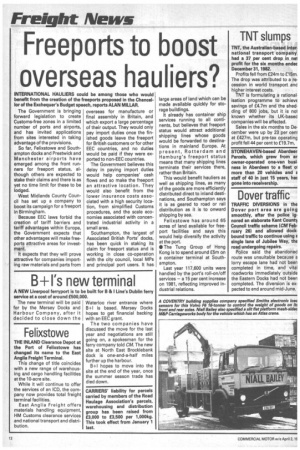Freeports to boost overseas hauliers.
Page 14

If you've noticed an error in this article please click here to report it so we can fix it.
INTERNATIONAL HAULIERS could be among those who would benefit from the creation of the freeports proposed in the Chancellor of the Exchequer's Budget speech, reports ALAN MILLAR.
The Government is bringing forward legislation to create Customs-free zones in a limited number of ports and airports, and has invited applications from sites interested in taking advantage of the provisions.
So far, Felixstowe and Southampton docks and Prestwick and Manchester airports have emerged among the front runners for freeport status, although others are expected to stake their claims and there is as yet no time limit for these to be lodged.
West Midlands County Council has set up a company to boost its campaign for a freeport in Birmingham.
Because EEC laws forbid the creation of tariff barriers and tariff advantages within Europe, the Government expects that other advantages will make freeports attractive areas for investment.
It expects that they will prove attractive for companies importing raw materials and parts from overseas for manufacture or final assembly in Britain, and which export a large percentage of their output. They would only pay import duties once the finished goods leave the freeport for British customers or for other EEC countries, and no duties would be paid if they were exported to non-EEC countries.
The Government believes this delay in paying import duties would help companies' cash flows and so make the freeport an attractive location. They would also benefit from the lower insurance costs associated with a high security location, from simplified Customs procedures, and the scale economies associated with concentrated industrial activity in a small area.
Southampton, the largest of Associated British Ports' docks, has been quick in staking its claim for freeport status and is working in close co-operation with the city council, local MPs and principal port users. It has large areas of land which can be made available quickly for storage buildings.
It already has container ship services running to all continents, but believes that freeport status would attract additional shipping lines whose goods would be forwarded to destinations in mainland Europe. At present, Rotterdam and Hamburg's freeport status means that many shipping lines terminate their services there, rather than Britain.
This would benefit hauliers as well as shipping lines, as many of the goods are more efficiently distributed direct to inland destinations, and Southampton says it is as geared to road or rail distribution as it is to onward shipping by sea.
Felixstowe has around 65 acres of land available for freeport facilities and says this would help diversify the activity at the port.
• The Tung Group of Hong Kong is to spend around £5m on a container terminal at Southampton.
Last year 117,600 units were handled by the port's roll-on/off services — a 15 per cent increase on 1981, reflecting improved industrial relations.












































































